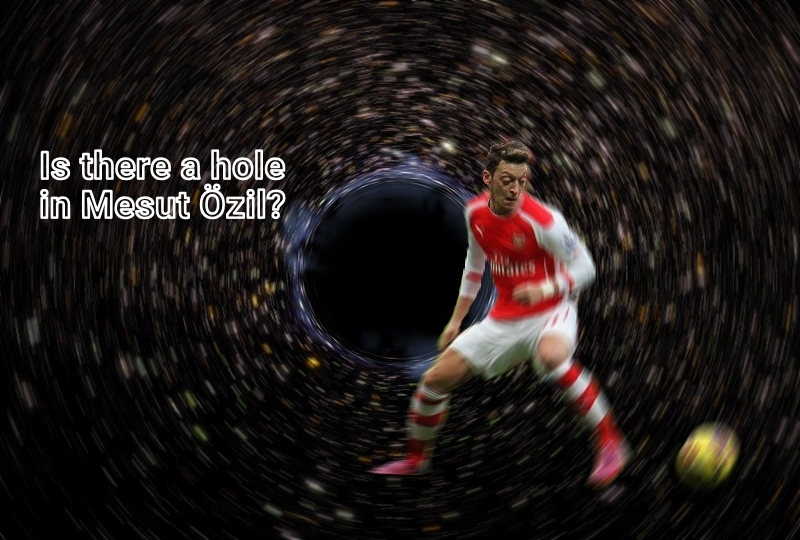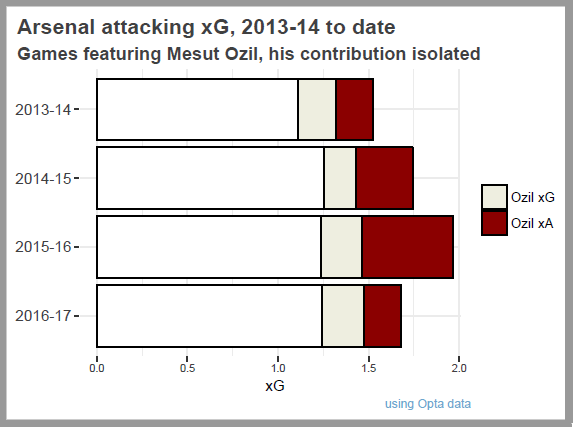I like Mesut Özil. I’m not interested in dull narratives about disappearing in big games, the guy plays football with an rare appreciation of space, an instinctive understanding of timing and makes it look as if his precision and deftness require no exceptional effort. When elite players possess these abilities, they become revered by aesthetes but can be viewed with suspicion by a hardcore who like to look for blame when results wane; he clearly doesn’t run around as much as they would like, and it's entirely possible that he's "foreign". Arsene Wenger is clearly with me in the former camp, and knew he was acquiring world class talent when spending a then large fee of around £40m in 2013. Of course Özil's chief strength is as a creator: 47 league assists in his three seasons at Real Madrid and a further 33 in his first three years at Arsenal, with 2015-16 seeing him log a total of 19, an impressive total only matched by Kevin De Bruyne’s 2014-15 season at Wolfsburg and surpassed by nobody in the big five leagues this decade.
For such an extravagant talent, Özil has never contributed a goal volume himself to match his creativity. In a career incorporating eight full seasons he hasn’t exceeded nine league goals, or thirteen in all competitions, and that’s something that appears to have frustrated his current manager. Wenger has spent much of the season organising his team with an altered frontline to last season, empowering Alexis Sanchez to move forward, bringing through Alex Iwobi and marginalising Olivier Giroud. Özil has occupied the centre in a typical attacking midfield role but these changes have contributed to an unusual outcome: he has more goals than assists this year (nine to six, all comps). Judging by recent comments from Wenger, he’s in favour of turning his chief creator into a more decisive goalscorer:
“I think what you want of him is to score goals, certainly we all feel there is still a gap between what he can do [and what he delivers on the pitch]. I think he is moving in the right way but with such a talent maybe you are a little bit unjust because you want always more. You feel there is no limitation in his game and so you are always ‘come on, give us more’. You always have the feeling that they can do more. This is not a frustration, it’s a target.”
This seems to miss the obvious benefit of using Özil as the creative force in the team--and others as the finishers.
2015-16, creator par excellence
Mesut Özil’s 2015-16 is one of the great creative seasons. Not only did he record 19 assists, but they were derived from 144 chances created, more than any other player in a top five league this decade. This chart is busy and has corners (and three assists) removed for a little clarity:
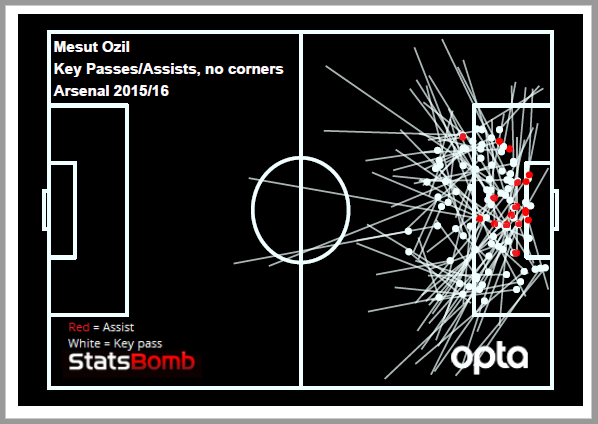
Özil created opportunities from everywhere and a stack in good locations, which bore rich reward. The four chances per game created were worth around half a goal per 90, an expected rate he matched. This is obscenely good. When a player is creating opportunities for his team at this level, any concerns about their personal goal total are secondary, and by a long way.
Mesut Özil’s 2016-17 season is not quite so impressive:
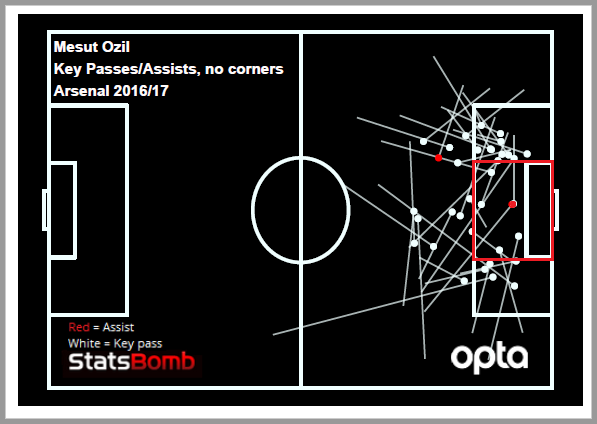
The red rectangle highlights two things. Firstly, this is where players usually score goals from--the red dot indicates Giroud’s Boxing Day header to break the deadlock against West Brom (clues...)--and secondly, for Özil, it’s practically empty. This season he is creating around 2.6 chances per 90, down from around four per 90 last season and also down on his previous two year's rates of a shade over three. And the drop off is almost entirely down to his failure to connect with teammates in good, central positions.
Team contribution
He missed a deal of time in 2013-14 and 2014-15, but if we look at the games he played in, his expected assist rate tracks uncannily with Arsenal’s team expected goal rate across his time at the club:
The obvious takeaway here is how Özil’s ability to create chances (xA) has been intrinsically linked to Arsenal’s overall goal expectation. Also worth noting is the consistency in his expected goal rate, which has barely moved, even allowing for Wenger's apparent desire for him to score more frequently but also we’ve posed some questions. Was 2015-16 the outlier or the norm? Can we expect that level of creativity again? Are there a confluence of factors that enabled this extended output?
Özil’s first and third seasons at Real Madrid found him creating around four chances per game--many of which were for Cristiano Ronaldo, who then publicly decried his sale--and that again worked out around half a goal per game, so there’s a clear precedent for Özil to hit these kind of numbers, albeit with one of the world’s great players as a target. Then again, Arsenal are a consistently high ranked team within the Premier League too, so for Özil to be capable of hitting an equivalent to the expected assist rate that he managed before as we saw in 2015-16 was never entirely implausible.
But what are the factors that enabled Özil to hit such a peak? And why has he dropped off so precipitously this season?
Core partnerships in shot creation
Across his three and half seasons at the club, Özil has reliably teamed up with the same core of players when creating chances. Santi Cazorla, Aaron Ramsey and Olivier Giroud have been part of the squad throughout while Alexis Sanchez came on board in 2014-15 and has generally found the German’s wavelength. The indestructible Chilean missed December 2015, but has otherwise been almost ever present in Arsenal’s first choice line up and has led the combinations with Özil in each of the last three seasons with 13, 26 and 11 so far this year. However, the expected value per shot was significantly higher in 2015-16 to 2016-17 (0.126 per shot compared to 0.077), something that’s easily understood when we look at Sanchez’s shot locations supplied via Özil:
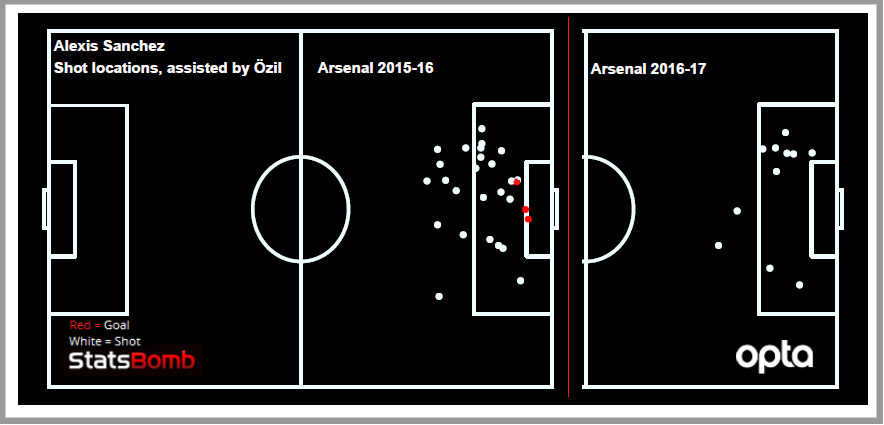
The other three have all spent significant spells out of the side due to injury:
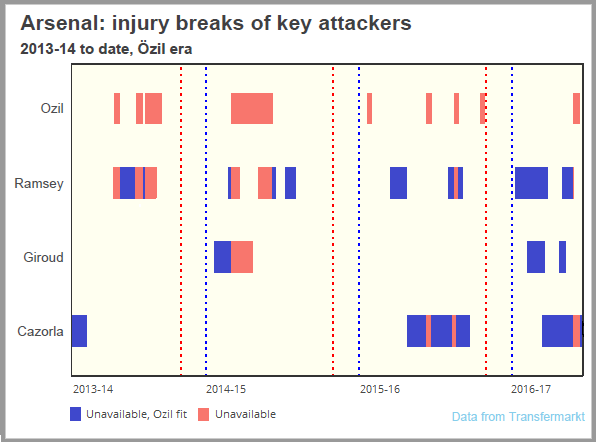
Cazorla’s miserable fortune with injuries have killed his last two seasons, but during 2013-14 and 2014-15, while playing thirty plus games in each, he ranked 1st and 4th for chances received by Özil with 13 and 7, so merits a quick mention here. Despite also missing huge chunks of time, Aaron Ramsey consistently ranks well for receiving key passes with Özil; third on the team in 2013-14 with eleven, second in 2014-15 with ten and during last season, second again with 19. During last season in particular, Ramsey was making the right runs and Özil was finding him:
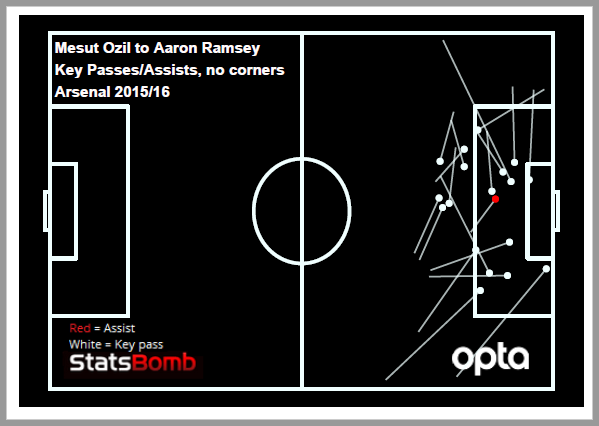
The seven key passes in the central in box zone Ramsey alone received from Özil during 2015-16 matches the volume of chances Özil has laid on in that zone for the entire team this season. That's a stark difference and while the connection with Ramsey created good volume, the quality of the chances Özil built for Giroud in 2015-16 starts to help us understand the prime difference this year:
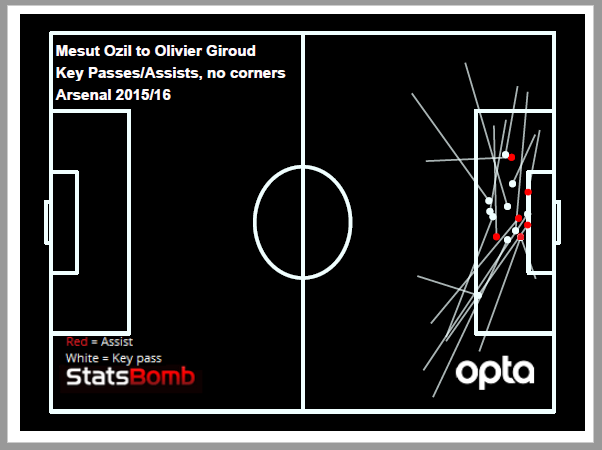
Largely a mix of free kicks, cutbacks and crosses, the Özil to Giroud combination certainly hit a hot streak (six goals from 17 attempts) but when locations are as close and central as seen here, the chance of a high conversion rate is significantly increased. They're good chances. The duo were also extremely effective in generating chances from corners. Just the one goal but Özil found Giroud with 16 across the whole of 2015-16. Is that a lot? Yes: no one passer to shooter combination achieved a higher total across any big five European season this decade; and it's an extremely useful addition to an attacking armoury.
Sanchez as striker, Giroud benched
With the effectiveness of Özil and Giroud so evident, it might seem odd that Wenger spent much of this season rebuilding his attack around Alexis Sanchez in a central forward role. Giroud’s central threat has been missed and Sanchez offers no direct threat from corners (Özil has found him three times in three and a half years). As shown, Özil has primarily had great success in linking with Ramsey, Giroud and Sanchez and this season the Welshman and Frenchman have a meagre four starts each from the 21 games played. Each of Giroud and Ramsey have spent spells out injured, but Giroud's lack of game time has largely been a strategic choice from Wenger: he has come off the bench ten times, playing an average of 17 minutes per appearance while also missing the squad entirely on three occasions.
Giroud may well be a streaky performer but if we consider that Sanchez’s performances appear to remain of a high standard however he’s used in the team (for all that he is better from the right if asked to play an attacking midfield role), we can deduce that picking a side to also get the best from Özil is a smart strategy. The evidence from the expected goal chart shows that a creatively hot Özil translates into a hot Arsenal. Fortunately for the team, it appears that Wenger may have recently worked this out. Giroud has started and scored in Arsenal’s last five competitive matches and Ramsey is once more fit and has started the last three. The first goal against Swansea was an embodiment of all I've shown, Özil released Ramsey into a dangerous position with a precision throughball, Ramsey fluffed the shot which screwed out to Sanchez, who lobbed the ball onto Özil’s head, his attempt blocked, Giroud finished the rebound. All four of Arsenal’s key men interacting and Özil once again central to it all.
The crux here is that the primary building blocks of Arsenal’s attacking strength during 2015-16 were Özil’s creativity and the interactions of these players with him. There is now a need to focus on an attack involving Ramsey, Özil, Sanchez and Giroud. This means that only one of Alex Iwobi, Lucas Perez, Theo Walcott, Danny Welbeck and Alex Oxlade-Chamberlain are likely to start with Granit Xhaka, Mohamed Elneny or Francis Coquelin (presumably alongside Ramsey) in central midfield. That the club have such a range of alternatives is testament to the underlying strength of a squad fully used to competing on multiple fronts but also regularly having to overcome injury crises.
By any objective measure, Özil and Sanchez are Arsenal's two star attackers and while early in the season it looked superficially as though Arsenal were set up to make them the main focus of their attack, the outputs since have shown that what has worked for Sanchez has stymied Özil. In most seasons, that might not make too much of a difference to Arsenal's inevitable rise into the top four, but this year the margins are thinner. It simply will not pay for Wenger to employ his attackers in a format that does not enable them to produce their best; fifth or six place are entirely possible outcomes for any of the teams chasing Chelsea should they suffer even a brief dip in form. To land there would increase pressure on Wenger and calls for his departure would intensify. Would Sanchez then stay? Would Özil? Arsenal need to keep their destiny in their own hands and add some impetus to their attack, with a blueprint clear enough.
Mesut Özil has had a clear hole in his chance creation this season, and needs his manager to stop worrying about his goalscoring and make the right selection choices to plug it.
________________________
Thanks for reading @jair1970
